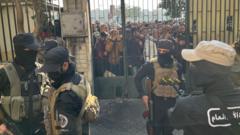In the precarious aftermath of the Syrian civil war, a new phenomenon has emerged in Damascus: reconciliation centres initiated by rebel group Hayat Tahrir al-Sham (HTS). On December 6, soldiers like Mohammed el-Nadaf and Mohammed Ramadan found themselves disillusioned with the Syrian army, abandoning their posts amid the swift advance of rebel forces. With testimonials highlighting inadequate pay and fledgling command structures, the sense of urgency among soldiers to distance themselves from the embattled regime is palpable.
Mohammed Ramadan shared his concerns about inadequate military support, stating that a meager pay of less than $35 a month forced him to seek additional employment to feed his family. The discontent culminated when he decided to leave, clutching the very rifle he had once been tasked to wield, now a symbol of his rejected loyalty.
At the HTS-operated reconciliation centre, former military and intelligence personnel gather, seeking temporary civilian ID cards in hopes of reintegrating into society. The centre, which formerly served as a branch of Assad's Baath Party, is characteristically bustling, as hundreds of men line up to relinquish their weapons, some expressing a deep desire to distance themselves from the regime's notorious actions.
HTS offers a general amnesty for those previously aligned with Assad, claiming that the overarching goal is to reclaim the arms possessed by the former regime and facilitate the transition of soldiers into civilian life. However, the social landscape remains fraught with anxiety as instances of violent reprisal have escalated alongside the relative calm fostered within the walls of the reconciliation centre.
The recent murder of three judges in northwest Syria, suspected to be politically motivated and targeting Alawites (the sect to which Assad belongs), has left many in the community fearing for their safety. The judges, considered innocuous bureaucrats, have sparked outrage among their families, who call for protection from potential backlash against perceived affiliations with the former regime.
Despite HTS’s public assurances regarding the safety of returning former soldiers and the promise of retributive justice for torture and killings, inconsistencies remain. Residents in areas once controlled by the regime remain deeply divided in their hope for stability, with many fearing that amnesty may not extend to all without bias.
As the political landscape of Syria continues to shift post-Assad, the delicate balance between reconciliation and retribution grows increasingly tenuous, leaving many caught in the crosshairs of an uncertain future. In this moment of transition, the constant threat of violence looms largely over both the soldiers seeking refuge in a new order and the remnants of Assad's regime whose legacies continue to haunt the nation.
Mohammed Ramadan shared his concerns about inadequate military support, stating that a meager pay of less than $35 a month forced him to seek additional employment to feed his family. The discontent culminated when he decided to leave, clutching the very rifle he had once been tasked to wield, now a symbol of his rejected loyalty.
At the HTS-operated reconciliation centre, former military and intelligence personnel gather, seeking temporary civilian ID cards in hopes of reintegrating into society. The centre, which formerly served as a branch of Assad's Baath Party, is characteristically bustling, as hundreds of men line up to relinquish their weapons, some expressing a deep desire to distance themselves from the regime's notorious actions.
HTS offers a general amnesty for those previously aligned with Assad, claiming that the overarching goal is to reclaim the arms possessed by the former regime and facilitate the transition of soldiers into civilian life. However, the social landscape remains fraught with anxiety as instances of violent reprisal have escalated alongside the relative calm fostered within the walls of the reconciliation centre.
The recent murder of three judges in northwest Syria, suspected to be politically motivated and targeting Alawites (the sect to which Assad belongs), has left many in the community fearing for their safety. The judges, considered innocuous bureaucrats, have sparked outrage among their families, who call for protection from potential backlash against perceived affiliations with the former regime.
Despite HTS’s public assurances regarding the safety of returning former soldiers and the promise of retributive justice for torture and killings, inconsistencies remain. Residents in areas once controlled by the regime remain deeply divided in their hope for stability, with many fearing that amnesty may not extend to all without bias.
As the political landscape of Syria continues to shift post-Assad, the delicate balance between reconciliation and retribution grows increasingly tenuous, leaving many caught in the crosshairs of an uncertain future. In this moment of transition, the constant threat of violence looms largely over both the soldiers seeking refuge in a new order and the remnants of Assad's regime whose legacies continue to haunt the nation.



















